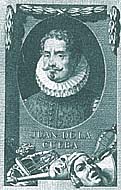<Back to Index>
- Physicist Felix Bloch, 1905
- Dramatist Juan de la Cueva, 1543
- Colonel of the Confederate States Army Cavalry Turner Ashby, Jr., 1828
PAGE SPONSOR

Juan de la Cueva (1543 – 1612) was a Spanish dramatist and poet.
He was born in Seville of an aristocratic family.
Towards 1579, he began writing for the stage. His plays, fourteen in number, were published in 1588, and are the earliest manifestations of the dramatic methods developed by Lope de Vega. Abandoning the Senecan model hitherto universal in Spain, Cueva took for his themes matters of national legend, historic tradition, recent victories and the actualities of contemporary life: this amalgamation of epic and realistic elements, and the introduction of a great variety of metres, prepared the way for the Spanish romantic drama of the 17th century. A peculiar interest attaches to El Infamador, a play in which the character of Leucino anticipates the classic type of Don Juan. As an initiative force, Cueva is a figure of great historical importance; his epic poem, La Conquista de Betica (1603), shows his weakness as an artist. The last work to which his name is attached is the Ejemplar poetico (1609), and he is believed to have died in Granada shortly after its publication.